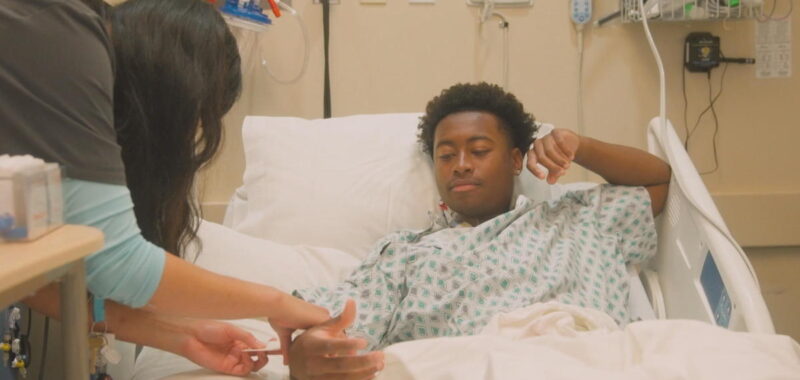PHILADELPHIA (CBS) — There’s new hope for people with sickle cell disease, which affects mainly African Americans. It’s gene therapy research at Children’s Hospital of Philadelphia that’s being called a game changer.
The first patient to get the therapy outside a research setting is a Cherry Hill college student who’s been waiting almost two decades for a treatment that will change his life.
Eighteen-year-old Austin Louis is an Eagles fan who’s never been able to play ball because he has sickle cell disease that causes excruciating pain.
“All types of pain, like, sharp, numbing, aching pain,” Louis said when describing the excruciating pain.
“Depending on how bad the pain is, we up it with the morphine,” Jennifer Louis, Austin’s mother, said.
She said her son’s entire life has been ruled by the genetic disease that causes normal donut-shaped blood cells to become sickle-shaped causing them to pile up and preventing oxygen delivery around the body.
“It’s hard, it breaks my heart. I feel like I’m helpless, there is nothing I can do,” Jennifer Louis said.
But now there is. Austin Louis is the first patient at Children’s Hospital of Philadelphia, outside a clinical trial to get a newly FDA-approved gene therapy.
“This is one of the biggest breakthroughs in the care of sickle cell disease,” Dr. Tim Olson with CHOP said.
Olson has been on the cutting edge of the research, describing it as “groundbreaking.”
The therapy starts with Austin Louis’ stem cells being collected, and then the DNA will be manipulated to normalize the blood.
“And that normal hemoglobin prevents the sickling complications that are seen in patients with sickle cell disease,” Olson said. “So, in effect, it’s curative and can prevent all of these devastating disease complications from occurring.”
Austin Louis will have to undergo chemotherapy before he gets the transplant of his edited stem cells. It’s going to mean more time at CHOP.
“I just want to hurry up and get there,” he said.
“It’s a breakthrough, I’m excited. We’ve been waiting — my husband and I, the family. We’ve been waiting since he was just a baby,” his mother said.
For Austin Louis, who’s taking online college courses for now, a life beyond sickle cell is a dream come true.
“Pain-free, I hope,” he said. “And I could travel the world, do anything, really open up my eyes and see it all everywhere.”
Austin Louis is looking forward to going to college in person, hopefully next year. The CHOP-led research on the gene therapy he’s getting showed 96% of patients were pain-free for at least a year after the therapy.

